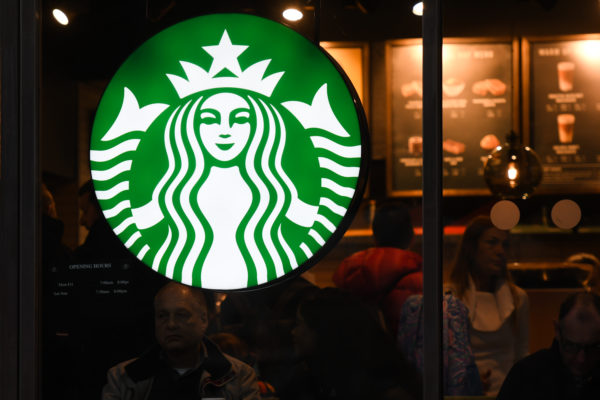A labor union released an eye-opening report highlighting pay inequalities and discrimination against Starbucks baristas.
The report, “One Job Should Be Enough: Inequality at Starbucks,” was created by Unite Here and released in late February. According to the study, between February and October 2019, Black baristas earned a median wage of $11.85, compared to $12.67 and $13 for Hispanic and white baristas, respectively. Stores in George Bush Intercontinental airport in Houston, Texas, paid their Black baristas $2.84 an hour less than their white employees.

“There were three Black baristas with more seniority than one of the white baristas who made $2.50 an hour less than that white barista,” the report stated. “Another white barista who had only 4 months more seniority than one of the Black baristas made $3.17 an hour more.”
The Starbucks stores are operated by HMSHost, a third-party company that operates 27 locations in airports across the country and employs over 23,000 people, per CBS. AutoGrill Group, HMSHost’s parent company, earned more $5.2 million in profits in 2018.
In addition to pay equities, 10 percent of workers claim they were denied promotions and 48 percent of denials were issued to Black workers. Forty-three percent of HMSHost’s unionized workers are Black and Black women representing 39 percent of those baristas.
Employees reported subpar wages have led to their going hungry, sleeping in airports and facing eviction because they are unable to keep up with their rent. Twelve percent of workers said they lacked money for food within 12 months prior to the survey; 50 percent of those food insecure baristas are Black.
Unite Here hopes raising the minimum wage for baristas will help alleviate some of these issues.
“A wage floor of $15 an hour for all Starbucks baristas at these 27 airports would eliminate the median pay gap between white and Black baristas entirely,” a Unite Here spokesperson told Atlanta Black Star via email Alternatively, if HMSHost agreed to the Union’s existing bargaining proposals in Atlanta and Charlotte, and also paid baristas at least the City of Houston’s airport living wage, HMSHost would decrease the median pay gap between HMSHost Black and white baristas across the 27 airports in our study from $1.85 to 58 cents.”
Baristas also experienced racism, xenophobia and other forms of discrimination in their workplaces.
“I have witnessed supervisors repeatedly use the n-word in casual conversation when referring to other people,” said Zeyad ElMashak, who isn’t Black. “The other supervisors and assistant managers that use the n-word never say it in front of the manager who is Haitian American, but they feel comfortable saying it in front of associates and baristas without fearing repercussions, regardless of race.”
Immigrant workers were also discouraged from using their native tongue while they worked.
“Sometimes when our managers are not present, me and my coworkers don’t follow that rule because I have coworkers who don’t speak English fluently so I need to talk to them in our native language to get the work done,” Nohawit Sahle, a barista at Dulles International Airport in Virginia, told researchers. She speaks Amharic, a language commonly spoken in Ethiopia.
“When Starbucks corporate inspectors came to our store, the managers made sure we did not speak Amharic, our native language. This makes me feel disrespected since the majority of my coworkers are immigrants.”
Unite Here surveyed more than 300 people for the report, according to a press release from the union. The pay information is derived from wage data from 2,000 unionized employees, reported The New York Times. HMSHost denies the accusations listed in the report and accused Unite Here of “using the media to frame its false narrative to negotiate” agreements for employees.


